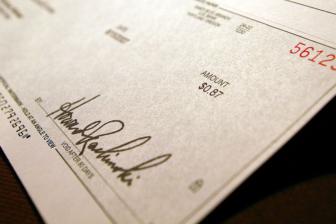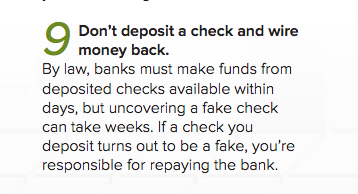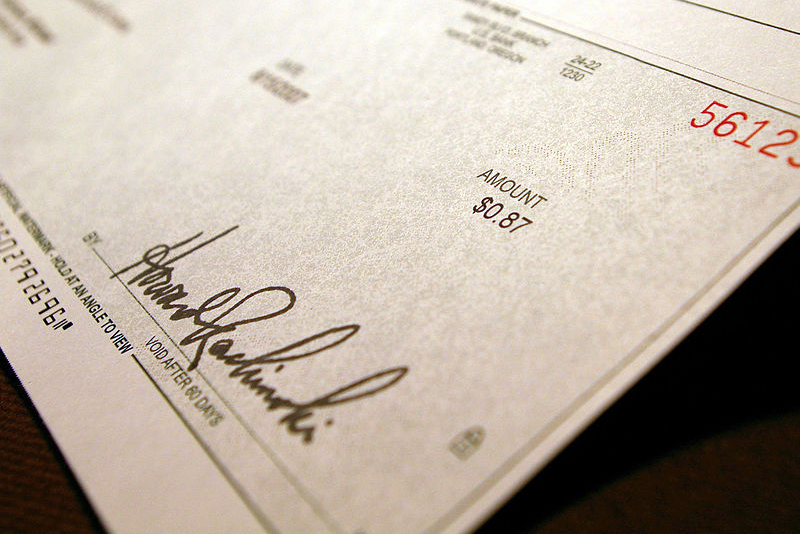A Darien business was scammed out of 90 grand in a classic fraud committed, this time, on a grand scale, apparently from the other side of the world.
It began on St. Valentine’s Day. Here’s how:
On Feb. 14, the victim’s business received from“Al Manahil Trading Equipment” a $27,500 online order for its products.
On Feb. 26, someone identifying himself as “Abdul Ali,” who said he was with the Al Manahil business, told the victim he had accidentally wired her $118,440 instead of the $27,500 billed to the company. He asked the Darien business to please wire back the difference — $90,895.
The next day, on Feb. 27, the Darien businesswoman did so from the Bank of America branch at 6 Sedgwick Ave., wiring the money to “Khaleel Ur Rahman Abdul Khalaque” at Emirates bank in Dubai, a part of the United Arab Emirates, with a coastline on the Persian Gulf.
All you need to remember to avoid this scam
- Banks are required to make money from deposited checks available to you within days, but weeks later the deposited check may bounce, and you’ll be the one on the hook for the money.
- So if you don’t know for sure that the check is good, don’t spend that money because it really isn’t yours until weeks later.
See more below.
The very next day, Feb. 28, two weeks after the original order, the victim’s bank notified her that the original wire into her account, for $118,440, had bounced. At noon, she reported the matter to Darien police.
An investigation is ongoing.
Same scam, different days, smaller scale:
- Norwalk Community College Student, 18, Loses $700 in Classic Check Scam (Dec. 1, 2017) — From that article:
The victim and the scammer went to an ATM at the bank, where the victim entered his PIN and the scammer deposited two checks totaling $1,800. He then made three withdrawals totaling $700 from the account. Then the two subjects drove the student back to the college, dropping him off there.
- Darien Police: Don’t Fall for Overpayment Scam in Online Car Selling (April 29, 2016)
- Darien Woman, 25, Taken in Internet Scam with Added Twist (Nov. 19, 2016)
- Police: Darien Teen Gets Close to Being Scammed in Summer Job Scheme (May 16)
Darienite has published the following sidebar more than once before:
More About Check Deposit Scams

Photo by Michael Kooiman on Flickr (via Wikimedia Commons)
A check (for quite a bit less than a typical fraud)
Under federal law, according to the Federal Trade Commission, banks are required to make money available from deposited checks within days — but it may take as long as weeks for a bank to discover that a deposited check is fraudulent.
The bank isn’t liable for what the law requires it to do. You — the person who deposited the check — are liable. If you become a victim, the con artist knew about this, but you didn’t: It’s your responsibility to know if the check you deposited is genuine before using the money.
The Federal Trade Commission’s blog about scams regularly features posts about this kind of scam. One post discusses how this kind of scam occurred with con artists using a website for babysitters and nannies.
One post has this description of the “fake check scam” and simple advice to keep you from getting victimized:
Fake checks drive many types of scams – like those involving phony prize wins, fake jobs, mystery shoppers, online classified ad sales, and others. In a fake check scam, someone asks you to deposit a check – sometimes for several thousand dollars – and, when the funds seem to be available, wire the money to a third party.
The scammers always have a good story to explain the overpayment – they’re stuck out of the country, they need you to cover taxes or fees, you’ll need to buy supplies, or something else. But when the bank discovers you’ve deposited a bad check, the scammer already has the money, and you’re stuck paying the money back to the bank.
So don’t deposit a check and wire money or send money back in any way.
In a brochure published by the FTC, “10 Things You Can Do to Avoid Fraud,” here’s No. 9:

Image from the FTC brochure
From “10 Things You Can Do to Avoid Fraud”
If you are victimized, you can report the matter to Darien police. Also, the FTC suggests:
If you or someone you know was tricked into transferring money – for any reason, report it to the money transfer company:
- MoneyGram: 1-800-666-3947 (1-800-955-7777 for Spanish) or at moneygram.com
- Western Union: 1-800-448-1492
Then, report it to the FTC.

